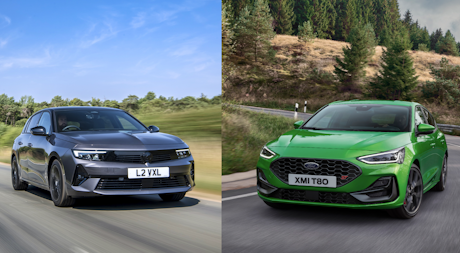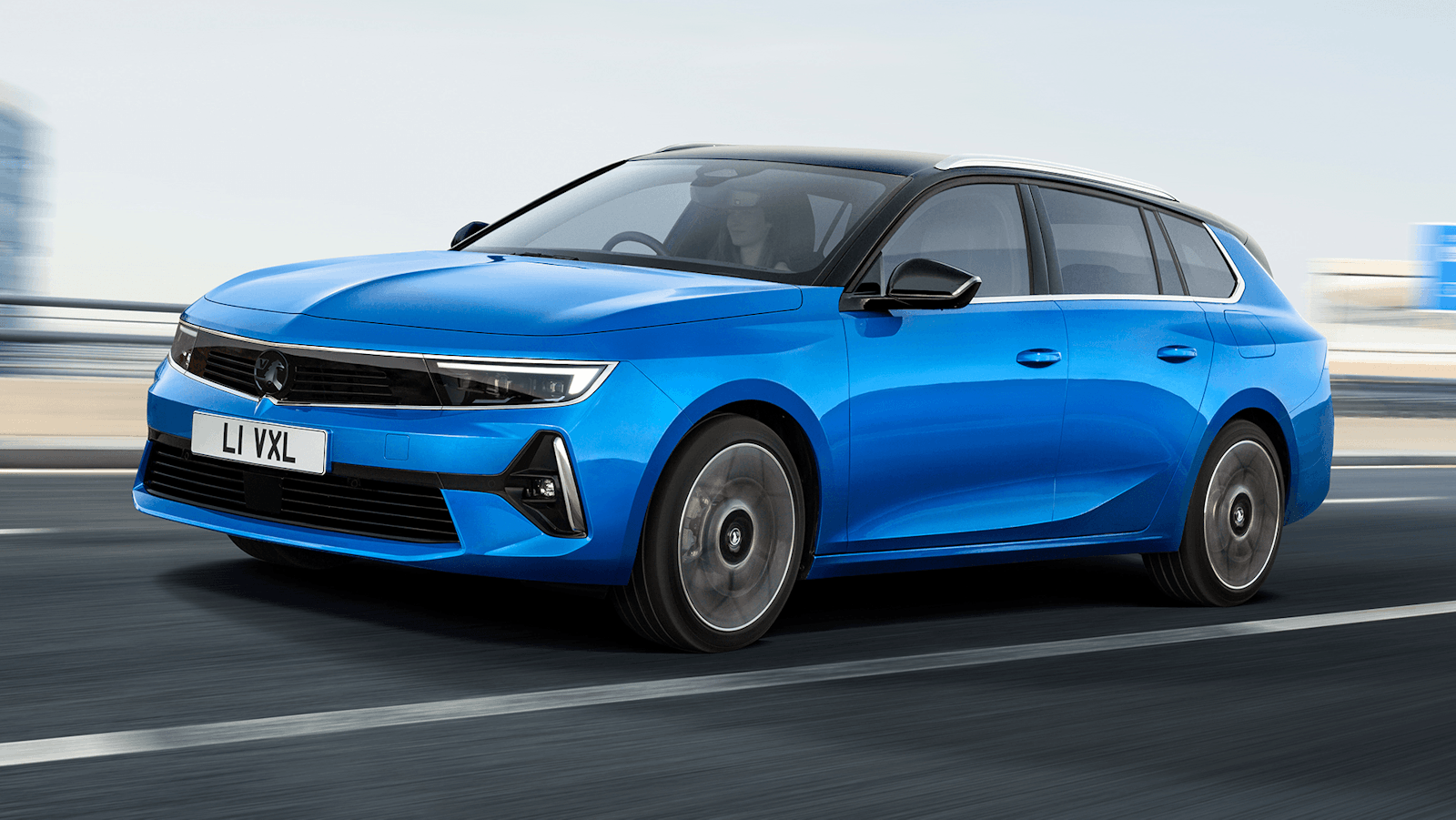Ford Focus vs Vauxhall Astra side-by-side comparison
August 02, 2022 by carwow staff

The Ford Focus and Vauxhall Astra are two key contenders in the family car market – but which should you choose?
Family cars are the do-it-all vehicles of the UK motoring landscape, and the Ford Focus and Vauxhall Astra are two of the most popular and accomplished cars in this class.
Offering a strong blend of space, driver engagement and technology, the Focus and the Astra also offer value for money when it comes to purchasing, and low running costs during ownership. Both cars fulfil similar roles then, but do so with different strengths and weaknesses; here, we assess each car’s talents.

Styling
The Ford Focus first appeared in 1998 and the current, fourth-generation Focus has been with us since 2019 – though in 2022 it received an update that brought lightly refreshed styling and improved infotainment. The Vauxhall Astra was originally launched in 1980 and the current model, the eighth version to grace our roads, was launched in 2021. Both cars are offered by default as a hatchback, or in estate guise for those after greater practicality.
As such the Astra is the newer model, and it’s arguably the most attractive Astra ever, featuring a sharp new design direction (with the firm’s now-hallmark ‘Vizor’ front end) that has been a feature of Vauxhalls since the firm was brought by the same group that owns Peugeot and Citroen.

The Ford Focus is a looker, too: it may not have the same angular lines as the Astra, but it’s a confidently stylish and understated car, and by no means the worse off for offering a more established design.
It’s also worth highlighting that different trim levels change the looks of the Focus to a fair degree: the standard car is handsome enough, but if you opt for a sporty looking ST-Line model (these bring the looks but not the performance of the performance-orientated Focus ST) then the car looks noticeably more purposeful and assertive. There’s also a rugged Focus Active, which features suspension that has been raised by 3cm, plus some outdoorsy styling cues.

Which car’s looks you prefer will be a matter of taste, naturally, but there’s an argument to be made that the Astra is the more stylish car, while the Focus offers more variety.
Interior and infotainment
There is much to like, and no major drawbacks, in the cabins of both cars. The latest Astra’s interior is light years ahead of the previous model, and the car shares its overall design with the Peugeot 308 to which it is mechanically related – though there are enough changes to differentiate the two cars. The Astra’s driving position is good, material quality is generally decent, and there are a fair few interior storage spaces.

The Vauxhall’s cabin is dominated by two large digital displays: one sits behind the steering wheel for the speedometer and the like, the other rests in the centre of the cabin for infotainment. They’re decent enough in terms of the clarity and functions, but the driver’s display in particular is surrounded by a large rectangular plastic bezel that slightly undermines the overall aesthetic – though posher Astras in the range feature a slicker design. A more positive point is that Vauxhall has fitted physical shortcut keys beneath the centre infotainment screen, so you don’t need to rely on the touchscreen for everything.
The Focus’s cabin is more conventionally laid out in that it features a traditional cowl around the driver’s main display; this houses analogue gauges (with a small centre digital screen) on lower-specification models, but a 12.3-inch digital display is offered as you move up the range. Ford’s main infotainment system is effective and easy to use, though the graphics feel somewhat dated. The 2022 update brought a larger 13.2-inch central infotainment screen, which absorbed the previously physical controls for the heating and ventilation.

The Focus has long set the handling benchmark in the family hatchback class, and this latest model is no exception. The steering is sharp, the suspension offers a good blend of comfort and cornering stability, the manual gearbox is slick (though the automatic could be snappier), and the Focus is as happy cruising on a motorway as you will be when you find a twisty back road to enjoy.

The Astra has traditionally played second fiddle to the Focus in the handling stakes, but the latest model narrows the gap to a fair degree. The steering is a little light, but the suspension offers a similar blend of comfort and composure as the Focus. The Focus is ultimately more engaging to drive, but the Astra can more than hold its head high, and makes for a refined and easy-to-drive companion.
Value for money
This is a slightly tricky issue to cover, as Ford is not taking factory orders for the Focus (as of August 2022) due to the global semiconductor shortage – though you can still order stock models through carwow. The most recently available price-list from Ford (dated April 2022) shows the Focus was available from £23,500 for the entry-level Trend model, rising to £24,750 for the Titanium, £25,580 for the ST-Line version, and £26,950 for the posh Titanium Vignale. The outdoorsy Focus Active, meanwhile, could be had from £25,580.
Comparing prices like-for-like with the Astra doesn’t quite work due to Ford pausing factory orders of the Focus, but for reference the Astra officially starts at £24,315 for the entry-level Design model, rising to £27,210 for the sporty looking GS Line, and £30,325 for the posh Ultimate. The plug-in hybrid, meanwhile, starts at £32,700.
Engines
Being cars that aim to cater to a variety of tastes and needs, there’s a decent amount of choice when it comes to Focus and Astra engines.
A 1.0-litre three-cylinder petrol engine is the mainstay of the Ford Focus range. This comes with 125hp as standard, while there’s also a mild hybrid version of the same engine; don’t confuse this with a full hybrid like the Toyota Prius though: mild hybrid technology effectively amounts to a sophisticated stop-start system.
You can also have the Focus with a 1.0-litre 155hp mild hybrid engine, while a 120hp 1.5-litre diesel will suit people who cover greater distances. A 2.0-litre diesel and 1.5-litre petrol used to be offered with the Focus, too. The 125hp 1.0-litre petrol engine (which takes 10 seconds to go from 0-60mph) will probably suit the needs of most buyers, though, while a six-speed manual gearbox is standard, with an eight-speed automatic optional on the 125hp petrol and 120hp diesel engine.
The Astra’s key engine is a three-cylinder 1.2-litre petrol motor that produces 110 or 130hp, or a 1.5-litre diesel with 130hp. A six-speed manual gearbox is standard, with an eight-speed automatic optional with the more powerful petrol engine and the diesel. We reckon the 130hp petrol engine will be the pick of the range.

One advantage the Astra has over the Focus is that it is offered as a plug-in hybrid (PHEV) model, and this combines a 1.6-litre petrol engine and an electric motor to produce 180hp, along with up to 43 miles (officially) of battery-powered motoring.
Practicality and boot space
The previous-generation Ford Focus was often criticised for its small boot, but the current car remedies that issue, as its 375 litres of cargo space is now class competitive. The Astra comfortably beats the Focus here thanks to its 422-litre boot, though. Front passengers should find it easy to get comfortable in both cars, but adults may find both cars a little tight in the back on long journeys – though this is true of most family cars, bar the Skoda Octavia in particular.
MPG, emissions and tax
Small, modern turbocharged petrol engines can be economical companions, and this is true of both cars. Precise figures will vary depending on which model you choose, but you can expect around 48-52mpg (officially) from a petrol Focus (up to around 55mpg for the 155hp mild hybrid), while the diesel Focus officially manages around 63-67mpg.
The Astra is comparable, with the 110hp 1.2-litre engine officially returning 51.4mpg, the 130hp model being roughly the same, and the diesel getting 60-62.8mpg depending on model. The Astra PHEV records a 255mpg figure, though this assumes you will be keeping the battery topped up and running on electric power for much of the time. If you are able to do this, the PHEV can make a lot of sense, despite its price tag, while company car tax rates also favour the plug-in hybrid Astra due to its low CO2 emissions of 24-26g/km.
Road tax for all cars will be a flat rate of £165 a year after the first year, as it’s unlikely to be possible to specify the Astra of Focus to above £40,000, at which point a £355 annual road tax supplement would be applied for five years.
Safety and reliability
It’s too soon to gauge the Vauxhall Astra’s reliability as it hasn’t been on sale for long enough, but sharing its mechanical backbone and engines with other cars from Peugeot/Vauxhall means it uses proven technology. The Focus, meanwhile, has a reasonable reputation for reliability, while both cars come with three-year/60,000-mile manufacturer warranties, which is standard for the industry, if unexceptional.
Reassuringly, both cars were rated well when crash-tested by Euro NCAP. The Focus scored the full five stars out of five, though the Astra only managed four stars, scoring 5% less than the Ford for adult and child protection, and 9% less in the safety assist category.
Verdict
The Focus and the Astra are very closely matched cars, and choosing either is no bad decision. If you value handling, the Ford is the car to go for, while if you want a modern design, it’s the Astra you should be looking at. Whichever car you’re after, though, be sure to check out carwow’s offers.
Looking for an easy way to change your car? Then carwow is the place to go. You can sell your car online for a great price, and get the best deals on a new one. All through our network of trusted dealers and all from the comfort of your home. Tap the button below to get started today.















